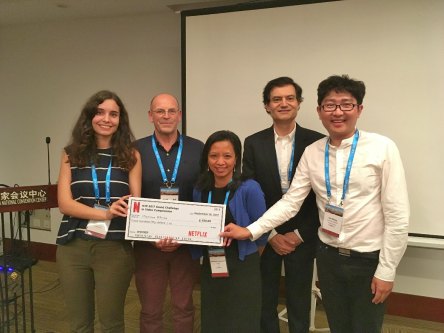Professor David Bull, Dr Fan Zhang and PhD student Mariana Afonso developed the cutting-edge video compression technology ViSTRA to target the challenge of delivering high-quality video content whilst minimising bit consumption rate, allowing high-speed transfer and consumption of video files.
The result of several years’ work, the patented ViSTRA technology is based on perceptually optimised spatio-temporal resampling within the encoder. This is combined with a content-adaptive neural network-based method of reconstructing the output video, which dramatically reduces bit rate and increases visual quality. The codec has attracted considerable attention from industry; the team is currently preparing a contribution to the next generation of MPEG video coding standards, ‘Beyond HEVC’.
The team were awarded the prize at the ICIP Conference held in Beijing, China in September, with PhD student Mariana Afonso receiving the prize for Video Coding based on Spatial Resolution Adaptation from Anne Aaron and Ioannis Katsavounides from Netflix.
Professor David Bull, Director of BVI said: “ViSTRA is the culmination of many years work in perceptually optimised video coding and dynamic resampling and the IEEE prize is a clear recognition of the strength of Bristol’s compression research - spanning engineering, computer science and psychology”.
The ViSTRA team, Mariana Afonso (left), David Bull (second left) and Fan Zhang (right) with Anne Aaron and Ioannis Katsavounides from Netflix who awarded the student prize to Mariana Afonso at the IEEE Video Compression Grand Challenge (below)
